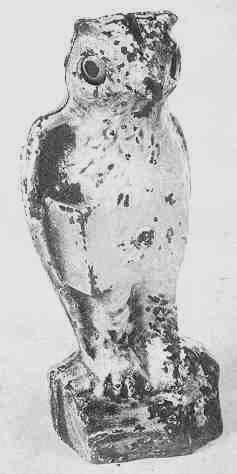Owl Type 1 (Slot in Head)
by F.H. Griffith - HOBBIES Magazine - August, 1974
 A bank that on the surface would seem easy to come by, but in fact
is surprisingly difficult to obtain, is our choice as No. 238 in the numerical
classification. This is the Owl Type I (Slot In Head) which simply doesn’t turn up
too often and particularly so in good to better paint condition. Over the years numbers of
collectors have stated their opinion that the Owl Type I was an underrated mechanical.
This is quite true up to a point, and the point is that it has a companion Owl Type II
(Slot In Book) which is rather common as banks go and certain collectors will settle for
this common type and not be concerned if they never get the rare one. Be that as it may,
it is definitely preferable to have the pair as each bank adds to the other from an
interest standpoint.
A bank that on the surface would seem easy to come by, but in fact
is surprisingly difficult to obtain, is our choice as No. 238 in the numerical
classification. This is the Owl Type I (Slot In Head) which simply doesn’t turn up
too often and particularly so in good to better paint condition. Over the years numbers of
collectors have stated their opinion that the Owl Type I was an underrated mechanical.
This is quite true up to a point, and the point is that it has a companion Owl Type II
(Slot In Book) which is rather common as banks go and certain collectors will settle for
this common type and not be concerned if they never get the rare one. Be that as it may,
it is definitely preferable to have the pair as each bank adds to the other from an
interest standpoint.
The Owl Type I was a member of a "family" group of mechanicals made by the Kilgore Manufacturing Company, Toytown Workers Division, Westerville, Ohio. Kilgore advertised the banks as "The Toytown Workers Group of Animal Banks" and "The Thrifty Four." They were known individually as Blinky the Owl, Flop-Ears the Rabbit, Jug-O-Rum the frog, and Pokey the Turtle. The stumbling block, and it’s a big one, to assembling this "family" group is the Turtle. As of this writing only six existing collectors have been able to accomplish this difficult task. And that’s not very many when you consider that collectors of mechanical banks number in the thousands.
There is a certain degree of mystery as to why the Turtle was made in such a limited quantity when, for example, such a large quantity of the Rabbit was manufactured. It is doubtful if we will ever have the complete factual story behind all this, and while in a way it would be interesting to know, it doesn’t really matter. What we do know is important — the production of the Turtle was extremely limited, and next to this as far as the "family" goes is the Owl Type I. As compared to the Turtle, many more Owls with the slot in the head were produced, but again not in the near quantities of those of the Owl Type II, The Frog, or the Rabbit.
Also somewhat of a mystery is why the Owl was made in two ways — slot in the head and slot in the book. Logically two factors would enter into this situation. One, easier production and assembly of the slot in book, and two, the mechanism of the slot in head did not function or hold up as well in usage.
The bank shown is in nice all original condition and colors are as follows: An overall coat of light tan was first applied to the figure, then a dark brown was applied in a sort of toned and shaded fashion leaving the upper two thirds of the front of the owl in light tan. The beak is orange as are the eyes which have black pupils.
To operate the bank a coin is pushed into the slot in top of the owl’s head. This causes the eyes to roll downward and they return to position as the coin falls inside the figure. A well made key lock coin trap is provided in the base. It is of interest to note that the same kind of trap was used in each of the "Thrifty Four." Except for the earlier type I Owl, the traps were in the main brightly nickel plated. Please remember too that in having two Owls the group numbers five, not four, and if one wants to carry to the extreme there is a variety of the Turtle Bank that could be considered by a collector of varieties as a sixth member. To date we know of no different types or varieties of either the Frog or Rabbit.
For the record the group of Kilgore banks are now known by the following names — Owl Type I (Slot In Head), Owl Type II (Slot In Book), Frog On Rock, Rabbit In Cabbage, and Turtle Bank. They are all exceptionally sturdy banks securely put together with rather simple but well constructed mechanisms with little to go wrong.
Another possible factor with having the slot in head changed to the book, the coin could not be inserted to the front part of the slot or directly in the center of the slot. It must be pressed into the slot from the top back of the head. It’s possible this operation was judged to be somewhat more difficult for a child as compared to the slot in the book.
Rumors are around concerning the possibility of another Turtle Bank having come to light. If this turns out to be factual it will be the seventh one known to exist and this poses the further possibility of a seventh existing collector to have the complete Kilgore group or a variety collector in possession of two Turtles.
